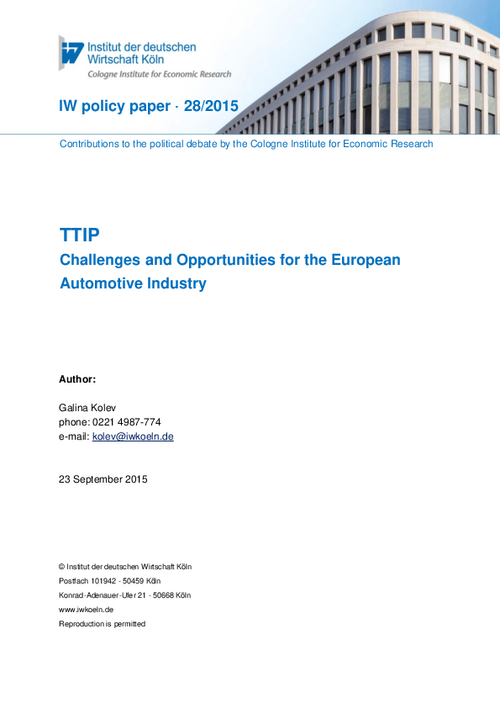Challenges and Opportunities for the European Automotive Industry

TTIP
IW policy paper

Challenges and Opportunities for the European Automotive Industry
The European automotive industry is the second largest manufacturer of motor vehicles worldwide (after China) and generates directly and indirectly millions of jobs EU-wide. It is characterized by a high degree of export orientation and the largest share of exports can be ascribed to the US market.
TTIP offers a unique chance to liberalize trade and to push the development of international safety and environmental regulations for products of the automotive industry. Eliminating tariffs on transatlantic trade bears a substantial opportunity for cost reduction and welfare increase. A particular opportunity arises for the EU from the divergence of tariff rates for passenger cars (2.5 per cent in the US and 10 per cent in the EU). From a mercantilist point of view, the EU should use the high EU import tariff rates for passenger cars as a bargaining chip to motivate the US negotiators to agree on trade liberalization, e.g. via elimination of non-tariff barriers.
TTIP should break new ground in regulatory cooperation, but eliminating NTBs and regulatory cooperation as a whole must not compromise the level of existing passenger and environmental safety, the EU’s precautionary principle or democratic legitimacy. This can only be achieved based on sound evidence, that technical standards and product regulations lead to the same safety level for cars driven both on the EU and US roads.

Galina Kolev: TTIP – Challenges and Opportunities for the European Automotive Industry
IW policy paper

More on the topic
Not so Different?: Dependency of the German and Italian Industry on China Intermediate Inputs
On average the German and Italian industry display a very similar intermediate input dependence on China, whether accounting for domestic inputs or not.
IW
China’s Trade Surplus – Implications for the World and for Europe
China’s merchandise trade surplus has reached an all-time high and is likely to rise further. A key driver appears to be a policy push to further bolster Chinese domestic manufacturing production, implying the danger of significant overcapacities.
IW